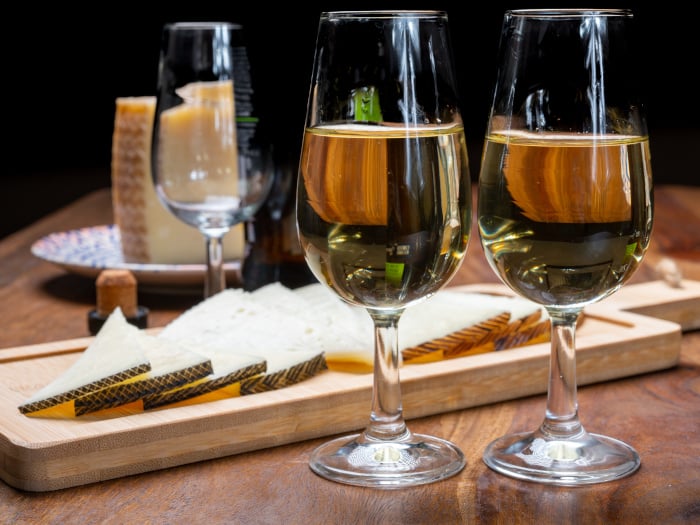There is a good selection of alcoholic and non-alcoholic dry sherry substitutes that you may already have on hand in your pantry!
Dry Sherry Substitutes
Being able to identify dry sherry substitutes and use them properly is more important than you may think, as this ingredient unexpectedly appears in quite a few recipes. Used in desserts, soups, stews, and sauces, dry sherry does add an important flavoring element. However, if you don’t like to drink dry sherry, chances are that you don’t keep a bottle stocked for the occasions when a recipe calls for it. Luckily, there may be some excellent alternatives to dry sherry such as dry vermouth, Madeira wine, apple cider vinegar, red wine vinegar, dry white wine, vanilla extract, and fruit juices that can keep your cooking flavored and interesting. [1]

Spanish fino dry sherry wine from Andalusia served with manchego Photo Credit: Shutterstock
Dry Vermouth
Another fortified dry wine, vermouth may be one of the top choices as a substitute for dry sherry. Particularly good in sauces and soups, you can substitute dry vermouth for dry sherry at a 1:1 ratio.
Madeira Wine
Another fortified wine option, be sure to choose a dry Madeira wine as a replacement for dry sherry. You can also use this in a 1:1 ratio. [2]
Apple Cider Vinegar
Although it won’t offer quite the same depth of flavor, apple cider vinegar can be a great non-alcoholic substitute. You might need to add a bit more to your recipe than is advised for dry sherry, but be careful to reduce the liquid content of your recipe elsewhere.
Red Wine Vinegar
Use this substitute in small amounts. You can mix the vinegar with a teaspoon of vegetable or chicken stock to achieve a similarly complex and rich flavor to dry sherry. [3]
Dry White Wine
In recipes where dry sherry may play a minor part, a dry white wine will similarly add a fruity and acidic flavor to your meal.
Vanilla Extract
This substitute may be the best used in dessert recipes. It provides a sweeter taste than dry sherry but will increase the complexity of a sauce or cake in a similar way. [4]
Fruit Juices
This is another alcohol-free option that may work great in desserts. Red or white grape juice would be the best choice, but apple juice is an option too. It all depends on your personal preference and the taste you’re trying to achieve in your dish.
Word of Caution: Cooking with alcoholic beverages results in only some loss of alcohol content. Foods baked or simmered in alcohol can retain anywhere from 4 percent to 85 percent of the alcohol, according to a study by the U.S. Department of Agriculture’s Nutrient Data lab. Also, if you are following a total avoidance of alcohol, you may want to skip using different kinds of wine vinegar as they do still contain some level of alcohol. [5]
